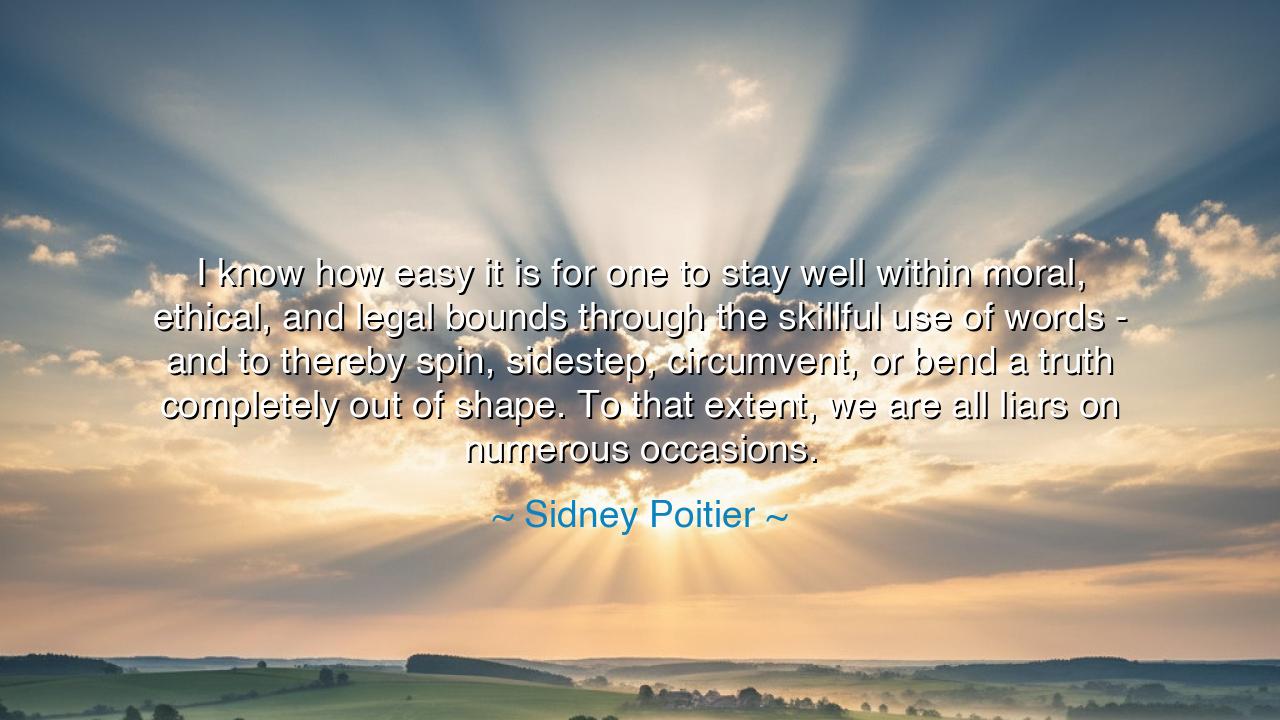
I know how easy it is for one to stay well within moral, ethical
I know how easy it is for one to stay well within moral, ethical, and legal bounds through the skillful use of words - and to thereby spin, sidestep, circumvent, or bend a truth completely out of shape. To that extent, we are all liars on numerous occasions.






The great Sidney Poitier, a man whose life was a testament to integrity and moral strength, once declared: “I know how easy it is for one to stay well within moral, ethical, and legal bounds through the skillful use of words — and to thereby spin, sidestep, circumvent, or bend a truth completely out of shape. To that extent, we are all liars on numerous occasions.” In this confession lies not cynicism, but profound self-awareness — a recognition that language, the proud gift of humanity, is both our light and our shadow. For the tongue that can heal can also deceive; the word that builds can also conceal. Poitier, who spent a lifetime striving for truth and dignity amid prejudice and illusion, understood that honesty is not merely the absence of lies — it is the courage to face reality without distortion.
From the earliest civilizations, the power of words has shaped the fate of nations. Ancient kings swayed their people not through swords, but through rhetoric, through carefully woven phrases that transformed tyranny into order, and conquest into “justice.” The Greek sophists taught the art of persuasion, yet Socrates, the philosopher of truth, warned that rhetoric without morality is a serpent disguised as wisdom. What Poitier reminds us is that even those who mean well may fall prey to this serpent — that we may, with polished words and justifications, “circumvent the truth” while still appearing virtuous. The moral boundary is thus not in the law or the code of ethics, but in the conscience that speaks in silence.
To understand the depth of his words, we must remember who Poitier was — a man who broke racial barriers in Hollywood with grace, intelligence, and moral clarity. He walked among those who could easily justify inequality with elegant excuses, who could twist justice with the “skillful use of words.” In such a world, his insight becomes both personal and universal. He had seen how language could make cruelty sound civilized, how the rhetoric of law or politics could “bend a truth completely out of shape.” His wisdom was born not from theory, but from the battlefield of life, where every word could either liberate or enslave.
History offers us countless mirrors of this truth. Consider the fall of Julius Caesar, whose death was justified by his assassins as the “defense of liberty.” With silver tongues, they clothed treachery in the language of patriotism. Even Brutus, honorable in intent, deceived himself with the nobility of his phrasing. And so, in the marble halls of Rome, men who spoke of justice committed murder — proof that one may be morally, ethically, and even legally justified, yet profoundly wrong in spirit. This is the danger Poitier warns us of: that words can make the dishonest appear pure and the unjust seem reasonable.
Yet, there is no bitterness in Poitier’s observation. Instead, there is humility. He does not accuse only others — he includes himself, and all of us. “To that extent,” he says, “we are all liars.” It is a recognition of human frailty, an acknowledgment that even the most upright among us have bent truth to comfort, pride, or convenience. It is not confession for shame’s sake, but for understanding — for one cannot walk in truth without first seeing one’s own capacity for deceit. Only those who admit their weakness can begin to purify their strength.
Thus, the lesson of this quote is not condemnation, but awakening. We are called to speak with awareness, to recognize that each word carries moral weight. Before we speak, we must ask: Does this clarify or confuse? Does it serve truth or self? For the greatest liars are not the ones who invent falsehoods, but those who disguise truth beneath clever speech. To live rightly, then, is to use words as instruments of illumination, not camouflage.
In our age — where rhetoric, media, and digital speech flood the world — Poitier’s wisdom is more urgent than ever. We live surrounded by narratives shaped to please, persuade, or manipulate, yet the noble soul must resist the temptation to twist reality for comfort. Let us strive to align our words with our hearts, to speak less for appearance and more for truth. For though all may lie at times, the difference between the hypocrite and the honest man is that the latter repents with clarity and seeks to do better tomorrow.
And so, remember this teaching: Truth is not an ornament of speech; it is the soul’s reflection. Guard your tongue, for it is a double-edged blade. Use it to heal, to teach, to reveal — not to conceal. For every time we choose truth over convenience, we bring light to the human story. And as Poitier himself lived and proved, even in a world of eloquent deceivers, one honest voice can restore dignity to mankind.






AAdministratorAdministrator
Welcome, honored guests. Please leave a comment, we will respond soon